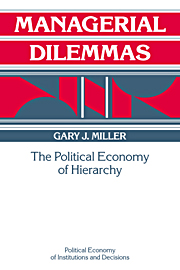Book contents
- Frontmatter
- Contents
- List of tables and figures
- Series editors' preface
- Acknowledgments
- Introduction
- PART I WHY HAVE HIERARCHY?
- 1 Market failures and hierarchical solutions: The tension between individual and social rationality
- 2 Bargaining failure: Coordination, bargaining, and contracts
- 3 Voting failure: Social choice in a dictatorial hierarchy
- PART II MANAGERIAL DILEMMAS
- PART III COOPERATION AND LEADERSHIP
- Epilogue: Politics, rationality, and efficiency
- References
- Name Index
- Subject Index
2 - Bargaining failure: Coordination, bargaining, and contracts
Published online by Cambridge University Press: 05 June 2012
- Frontmatter
- Contents
- List of tables and figures
- Series editors' preface
- Acknowledgments
- Introduction
- PART I WHY HAVE HIERARCHY?
- 1 Market failures and hierarchical solutions: The tension between individual and social rationality
- 2 Bargaining failure: Coordination, bargaining, and contracts
- 3 Voting failure: Social choice in a dictatorial hierarchy
- PART II MANAGERIAL DILEMMAS
- PART III COOPERATION AND LEADERSHIP
- Epilogue: Politics, rationality, and efficiency
- References
- Name Index
- Subject Index
Summary
If people come to bargaining already knowing their [own] private values for a good, then no arrangement exists that will lead them to trade precisely when they should, given that each can choose to walk away. So the king's power to coerce really helps to achieve efficiency.
Farrell (1987b: 120)A breakdown in the efficiency of competitive market processes may create a prima facie case for hierarchy. Since a social dilemma exists when individual self-interest leads to inefficient outcomes, efficiency would seem to require a mechanism capable of coercing individuals to do what they would otherwise have no incentive to do.
But is hierarchy really necessary to escape social inefficiency? Why can't the individuals facing a social dilemma agree among themselves on the course of action necessary and voluntarily commit themselves to a mutually binding legal contract that would resolve the dilemma? A voluntary contract such as this would simply represent an extension of the voluntaristic market mechanism. Just as a private exchange contract commits a buyer and a seller to give up assets in return for considerations defined in the contract, a public goods contract could commit two parties in a public goods dilemma to contribute to the purchase of a public good in return for the benefits of other parties' contributions.
Indeed, a relatively nonhierarchical form of contractual coordination called “inside contracting” prevailed in many large-scale industries at the turn of the century.
Information
- Type
- Chapter
- Information
- Managerial DilemmasThe Political Economy of Hierarchy, pp. 36 - 57Publisher: Cambridge University PressPrint publication year: 1992
